Highlights of Findings on Latino Student Success
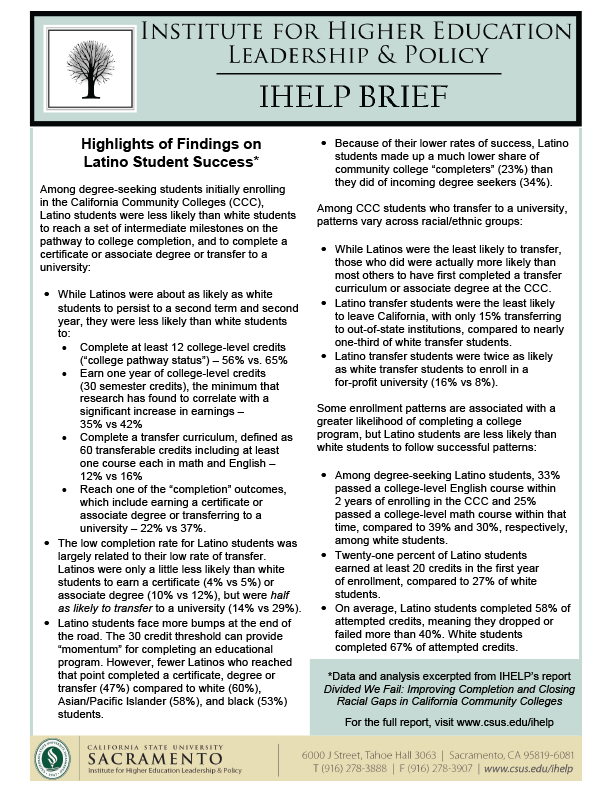
This one-page brief highlights the findings regarding Latinos in California in the IHELP report, Divided We Fail: Improving Completion and Closing Racial Gaps in California’s Community Colleges. It was prepared at the request of Excelencia in Education to complement their series of reports on Latino college completion.
Performance Incentives to Improve Community College Completion: Learning from Washington State’s Student Achievement Initiative
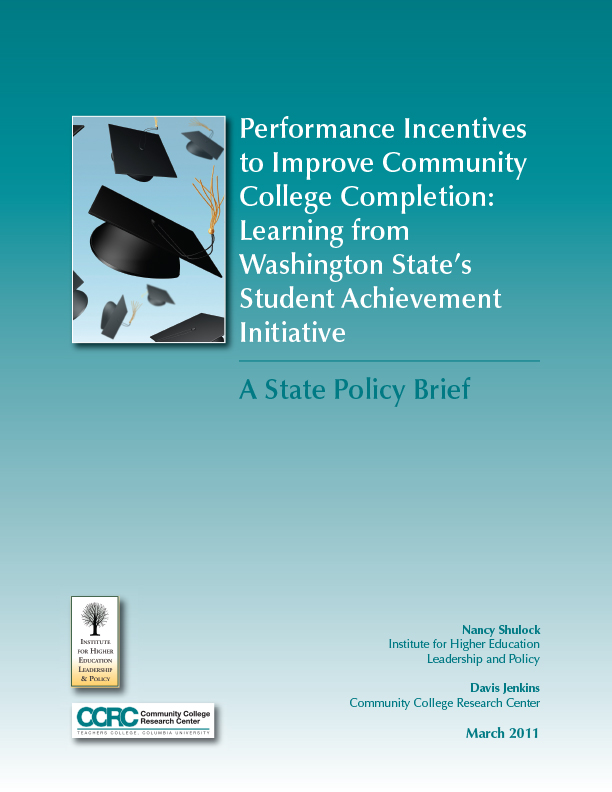
This policy brief, jointly produced by IHELP and the Community College Research Center (CCRC) at Columbia University, offers lessons to date about the Student Achievement Initiative (SAI), a policy adopted by the Washington State Board for Community and Technical Colleges that draws on intermediate measures of student progress to reward colleges for improvements in student achievement. The brief examines policy choices that Washington faced in designing and implementing SAI, the choices that leaders in other states will confront when considering adopting performance incentive policies as a means to improve student outcomes.
The Road Less Traveled: Realizing the Potential of Career Technical Education in the California Community Colleges
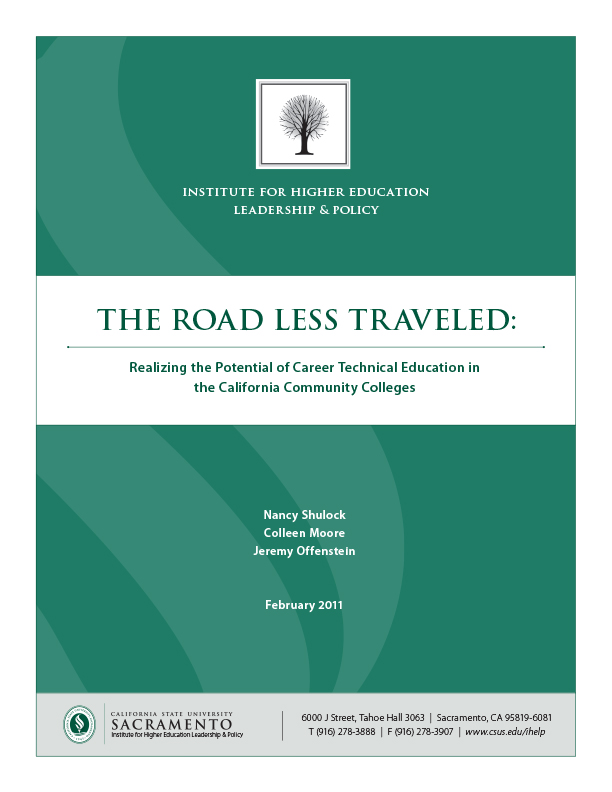
This report examines four high-wage, high-need career pathways in the California Community Colleges as a basis for exploring the career technical education mission and its role in the college completion agenda. The study found that the potential of CTE to help meet the state’s completion, workforce, and equity goals is not fully realized due to a lack of priority on awarding technical certificates and degrees and an absence of clear pathways for students to follow in pursuing those credentials. The report offers recommendations to strengthen the CTE function.
Divided We Fail in LA: Improving Completion and Closing Racial Gaps in the Los Angeles Community College District
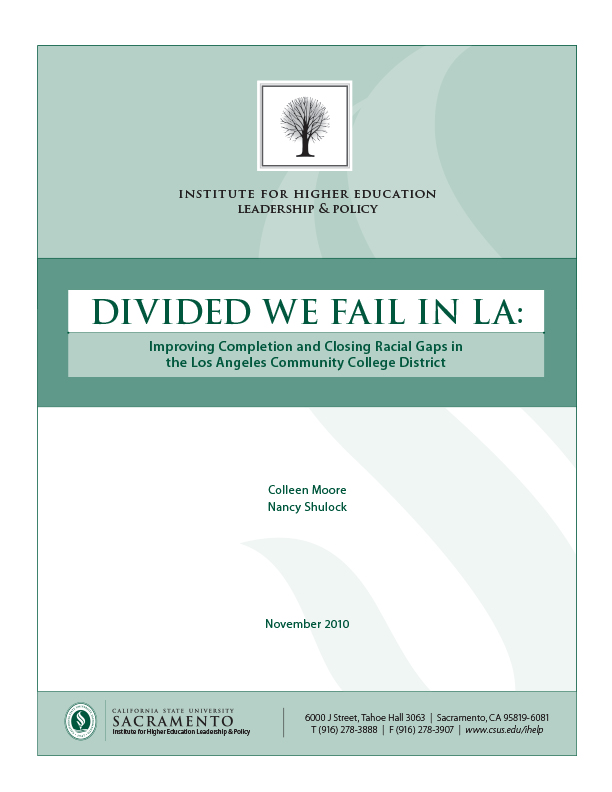
This report applies the approach used in Divided We Fail to the nine colleges of the Los Angeles Community College District. The study tracked the 2003-04 entering cohort of degree- and certificate-seeking students over six years, analyzing their progress along a series of intermediate milestones and completion outcomes by race/ethnicity. The report points out the risks posed by racial/ethnic disparities and offers recommendations for changes to policy and practice with a goal of improving student success, especially among underrepresented minority populations.
Divided We Fail: Improving Completion and Closing Racial Gaps in California’s Community Colleges
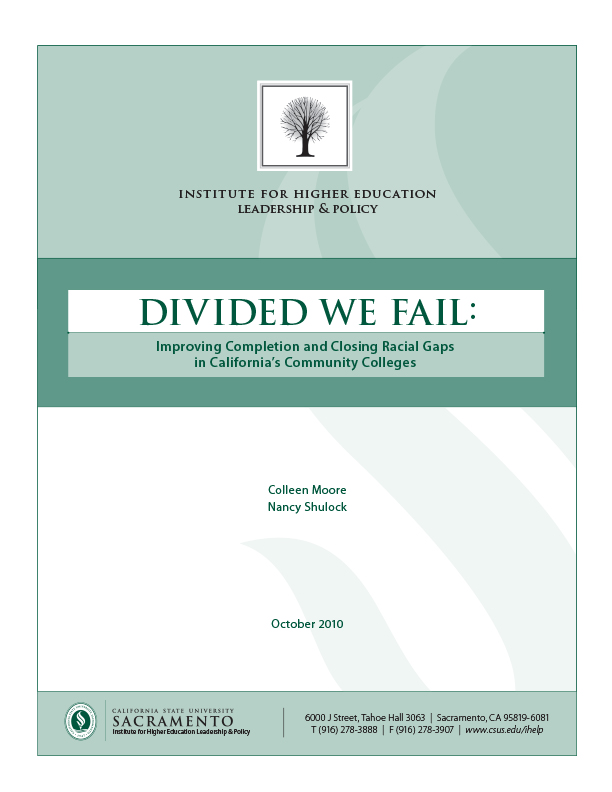
This report analyzes the progress and outcomes of degree- and certificate-seeking students in the California Community College system. The study tracked the 2003-04 entering cohort over six years, analyzing their progress along a series of intermediate milestones and completion outcomes by race/ethnicity. The report emphasizes that low completion rates and continued racial/ethnic disparities pose serious risks to the state’s future prosperity and offers recommendations for changes to policy and practice with a goal of improving student success, especially among underrepresented minority populations.
Taking the Next Step: The Promise of Intermediate Measures for Meeting Postsecondary Completion Goals
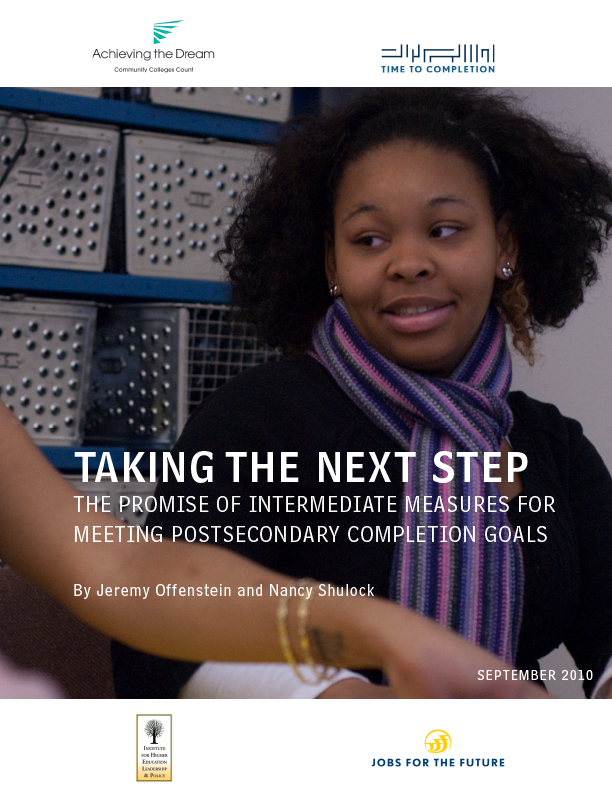
This report, sponsored by Jobs for the Future, examines system, state and multi-state efforts and multi-institution initiatives to develop and use intermediate measures of student success as a tool to improve accountability and guide institutional efforts to improve student success. The report distinguishes between milestones that must be attained in order to get to completion and success indicators that increase a student’s chances of completion. The report analyzes the differences in approach, definitions and uses of the data on intermediate measures and offers recommendations on the collection, reporting and effective use of the data and the need for common practices and definitions.
Prerequisite Policy in the California Community Colleges
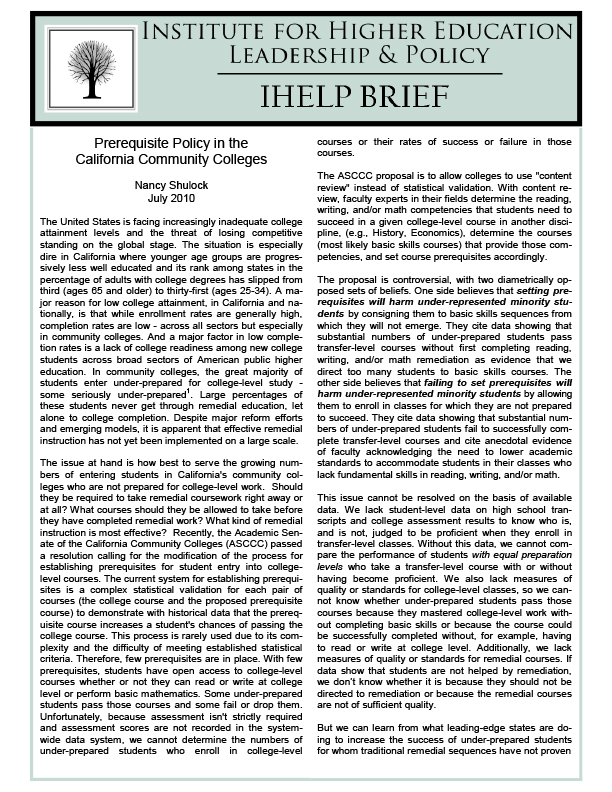
This brief examines proposed changes to prerequisite policy in the California Community Colleges. It discusses the challenges faced by the CCC regarding under-prepared students and the current trends in other states to increase the success of under-prepared students. A written statement containing this information was presented to the CCC Board of Governors.
Beyond the Rhetoric: Improving College Readiness Through Coherent State Policy
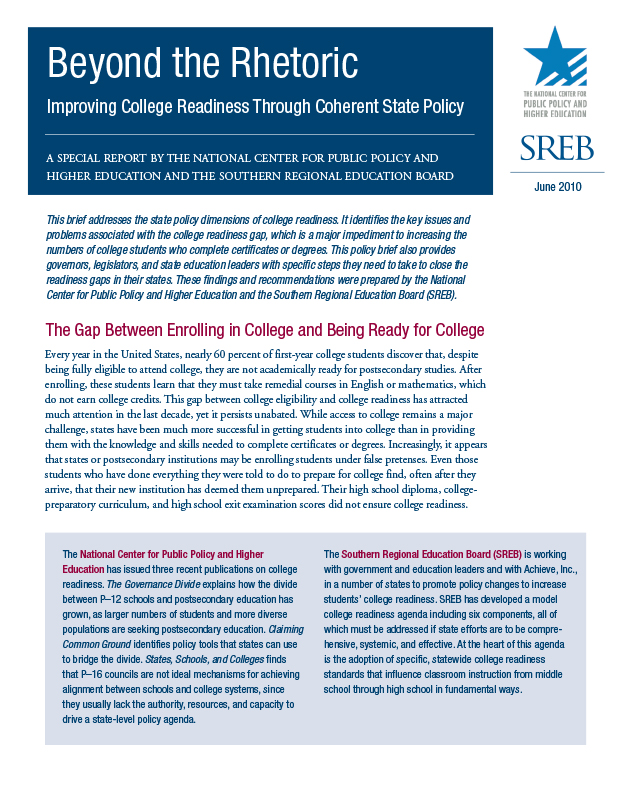
his policy brief, jointly produced by the Southern Regional Education Board and the National Center for Public Policy and Higher Education, examines the college readiness problem and offers recommendations to help government and educational leaders strengthen their efforts to lessen the college readiness gap. IHELP Director Nancy Shulock participated in the workgroup that produced the report, which analyzes the causes of the college readiness gap and discusses how states could better address the problem.
Advancing by Degrees – A Framework for Increasing College Completion
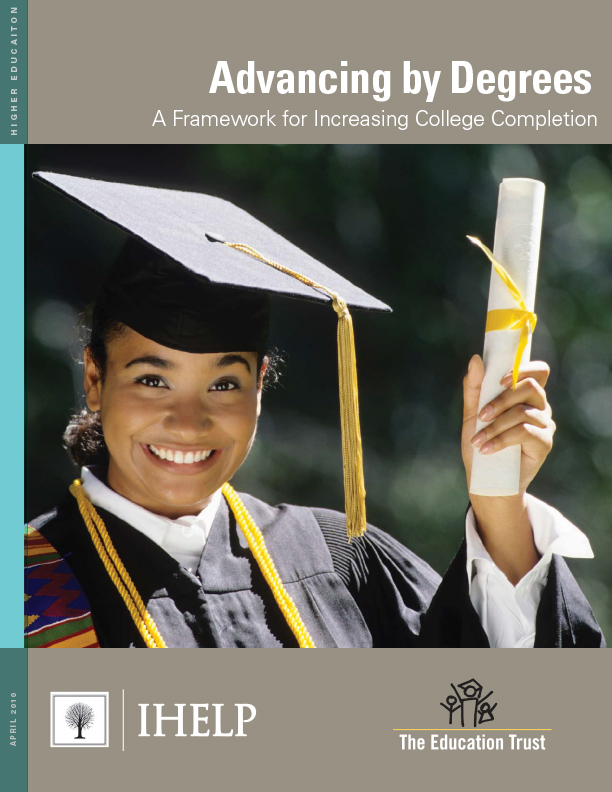
This report, produced by IHELP for The Education Trust, offers higher education leaders guidance on using data to monitor student progress and applying the results to inform changes in policy and practice to help more students earn degrees. The report describes a framework of milestones, or intermediate educational achievements that students reach along the path to degree completion, and on-track indicators, or academic and enrollment patterns that are related to a greater likelihood of graduation. The report uses data from the State University System of Florida and the California Community Colleges to demonstrate how the framework can be used in two-year and four-year institutions to diagnose where and why students fall off the path to success and to make changes in policy and practice to increase degree completion.
Strategies for Improving Higher Education in California: Some Lessons from Florida for California’s Higher Education Policy
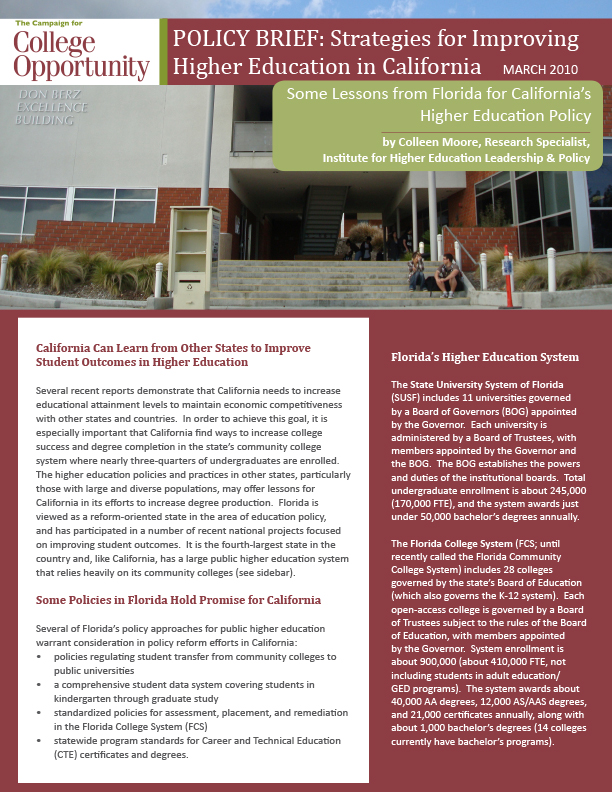
This policy brief, sponsored by the Campaign for College Opportunity, examines the public higher education policies and practices of the state of Florida in order to determine possible lessons for California in its efforts to increase student success and degree completion. While Florida still faces significant challenges, some of the state’s policy approaches for public higher education warrant consideration in California’s quest for improvement, specifically the comprehensive student data system, policies related to student transfer from community colleges, statewide Career Technical Education program standards, and standardized policies for assessment, placement and remediation.
